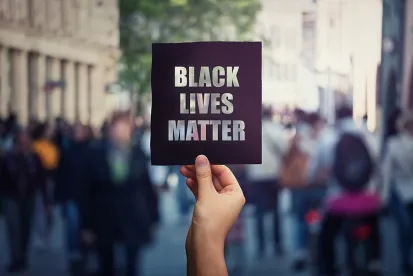A district court in Massachusetts has held that Whole Foods did not violate Title VII when it told its employees they could not wear masks and apparel referring to the Black Lives Matter (BLM) movement while at work. This outcome demonstrates the limits of Title VII protections against race discrimination and retaliation, as well as the absence of broad general protections for free speech in private sector employment.
The Title VII race discrimination and retaliation suit was brought as a class action against Whole Foods and its parent company, Amazon, by 28 employees who worked at various Whole Foods stores throughout the country. The 28 employees were both Black and White. See Frith v. Whole Foods Mkt., Inc., No. 20-cv-11358-ADB, 2021 WL 413606 (D. Mass. Feb. 5, 2021). On February 5, 2021, Judge Allison J. Burroughs of the United States District Court for the District of Massachusetts dismissed all claims against Amazon and all but one claim against Whole Foods, permitting only one retaliation claim to go forward.
Whole Foods’ Policy on Employee Apparel
The murder of George Floyd by a police officer on May 25, 2020, sparked nationwide protests over racial injustice and police brutality and reignited support for the BLM movement. Whole Foods workers began to wear masks and other clothing with BLM messaging to show their support but were immediately told by their supervisors that their BLM apparel was against the company dress code. Whole Foods and Amazon have pledged over $5 million in support of BLM, so the employees were surprised that the dress code policy would be enforced against their expressions of support. Whole Foods’ company-wide policy prohibits wearing any clothing with visible slogans, messages, logos, or advertising unrelated to Whole Foods. This policy had largely been ignored in the past, and the plaintiffs were aware that employees wore apparel with LGBTQ+ messages, as well as endorsement of the National Rifle Association, anarchist symbols, and the phrase “Lock Him Up.” Whole Foods began to discipline employees who refused to comply with the dress code in the summer of 2020, sending them home, putting them on corrective action pathways, and giving them disciplinary points. Only one employee was actually fired; some acquiesced to their employer’s demand, some quit their jobs, and some kept on wearing the masks despite being disciplined.
Employees Allege Race Discrimination
The plaintiffs filed suit challenging the unfair application of the mask policy on July 20, 2020. They alleged that the companies violated Title VII by discriminating against employees on the basis of their race. They explained that the selective enforcement of the dress code policy adversely affected Black employees and employees who expressed solidarity for their Black co-workers by wearing BLM apparel on the job. Plaintiffs also asserted a retaliation claim and argued that the discipline of employees who wear BLM on the job is unlawful. In response, both Whole Foods and Amazon filed motions to dismiss the claims.
In analyzing the plaintiffs’ discrimination claims under both a disparate treatment and disparate impact framework, Judge Burroughs determined that the plaintiffs failed to meet their burden. To prove disparate treatment, the plaintiffs needed to establish that the dress code policy treated employees differently based on race, and to prove disparate impact they needed to establish that the dress code policy had an adverse impact on Black employees. The plaintiffs did not allege that Amazon or Whole Foods disciplined them because of their race or that applying the dress code policy had a disproportionate impact on employees of a particular race. Both White and Black employees wore BLM apparel and both were disciplined. Plaintiffs thought highlighting that defendants allowed employees to wear other messaging but then dropped the hammer when they wanted to wear BLM apparel demonstrated race discrimination, but Judge Burroughs rejected that argument. She explained that, although it may be unfair, inconsistent enforcement of a dress code does not amount to a Title VII violation because the different treatment was based on the messages being conveyed, not the race of the employees. She indicated that the plaintiffs, knowing that employees do not have free speech rights in private sector employment, were really trying to shoehorn their free speech claim into a Title VII discrimination claim.
For the same reason, Judge Burroughs rejected the plaintiffs’ argument that they were discriminated against on the basis of their association with Black co-workers. The plaintiffs relied on the landmark Supreme Court decision in Bostock v. Clayton County, 140 S. Ct. 1731, 1741 (2020), to argue that Whole Foods could not insulate itself from a discrimination claim by disciplining both Black and non-Black employees but rather was simply doubling its liability. But Judge Burroughs emphasized the focus must be on whether the employees were disciplined because of their race or association with individuals of another race. Therefore, a straightforward application of this principle makes clear that the employee's race did not affect how the dress code policy was enforced. In other words, Whole Foods treated all employees wearing BLM attire equally, regardless of race.
Court Rules on Retaliation Claims
Judge Burroughs also made swift work of the plaintiffs’ retaliation claim. A retaliation claim requires proof that the individual engaged in protected activity, i.e., protested illegal actions by their employer or filed a charge, and then was subjected to an adverse employment action because of that protected conduct. With the exception of plaintiff Savannah Kinzer, the court held that the plaintiffs failed to sufficiently state a claim. Ms. Kinzer, a Whole Foods employee, refused to adhere to the dress code policy and encouraged other employees to wear BLM masks too. Kinzer was then terminated, allegedly for not working her assigned shift. Whole Foods maintained that no one was terminated for not adhering to the mask policy. However, Judge Burroughs determined there was sufficient evidence to demonstrate that Kinzer was terminated for not following the mask policy and for filing claims with the Equal Employment Opportunity Commission and the National Labor Relations Board. The other plaintiffs did not establish the elements of a retaliation claim because they did not engage in protected conduct. To support a retaliation claim, the plaintiffs do not need to prove that the behavior they were protesting against actually amounted to a Title VII violation, but they do need to show that they had a good-faith and reasonable basis to believe that their employer’s conduct violated the law. “Wearing BLM attire to protest racism and police violence against Blacks and to show support for Black employees cannot support a Title VII retaliation claim” Judge Burrough’s wrote. Plaintiffs were not opposing a possible unlawful employment practice by their employer; instead, they were opposing their employer’s right to restrict free speech in the workplace and opposition to that conduct does not challenge Title VII discrimination.
On March 2, 2021, the plaintiffs filed an appeal from the February 5 decision and filed a single-count amended complaint on the retaliation claim. The amended complaint seeks relief only for Kinzer and two other former employees who were terminated after wearing BLM apparel or after informing management that they were a part of the lawsuit.
Although Judge Burrough’s ruled in favor of Amazon and Whole Foods, they face an uphill battle in the court of public opinion. During a time when people are boycotting stores and canceling brands that are not combating systematic racism, Whole Foods’ stance will not go unnoticed. Comparable companies should consider creating policies sensitive to the present racial landscape.



 />i
/>i
